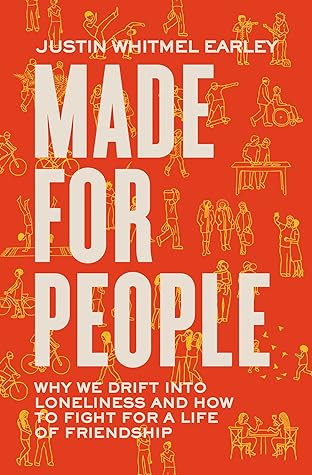More on this book
Community
Kindle Notes & Highlights
Read between
February 26 - February 26, 2025
The habits that reshape our lives take practice, and so it is with the habit of confession.
Having a friend who loves you enough to tell you the truth is rare. But honesty is the art of a true friend.
If vulnerability means having the courage to speak the truth about yourself, then honesty means having the courage to speak the truth about someone else.
The power to name is the power to create reality.
The art of honest words is a way to reflect the image of God, to be a friend like Jesus, and to renovate lives for the kingdom.
We don’t know what to do with nonsexual love, which makes us bad at friendship.
We’re not a house that needs to be torn down, but we are a house that needs serious, serious renovation.
the same love that accepts you as you are can also tell you to change. Because real love is for your good, not for your comfort.
Rebuke can be serious without being harsh.
Grace means we can hear people out even if they’re not right.
If rebuke is being honest enough to call someone’s attention to a dangerous reality that should be avoided, encouragement is being honest enough to call someone’s attention to a good reality that should be cultivated.
Conversation is a foundation of friendship.
from loving your shared hobbies to loving each other, then you are not in a friendship but a companionship.
“Lovers are always talking to one another about their love; Friends hardly ever about their Friendship.”
Promising, in a real sense, is an identity anchor.
To promise friendship is to fight for an island of trust and stability in this ocean of uncertainty called life.
The problem is that real freedom is not the ability to choose what you want in any given moment. Real freedom is the ability to do what you were made for and choose the good.
Naming a friendship, in and of itself, can be a great act of commitment.
together. We were normal and deeply flawed. But normal and deeply flawed is where all meaningful friendships start.
But suffice it to say that naming relationships has a power to spark commitment that no one should ignore.
Aristotle is famous for claiming that a life without friendship is not worth living,9 but he is also famous for distinguishing that having a network you use or an acquaintance you enjoy is far different from having a friend you are bound to in the love of phileos.
“A frog in a well cannot discuss the ocean, because he is limited by the size of his well.”
If covenant and commitment are the ways we imitate God to deal with the uncertain future, forgiveness allows us to imitate God to deal with the past.
that friendship “halves our troubles and doubles our joys.”
To be friends with sinners is our only option. You should expect to be friends with people who are downright selfish, who don’t care for you exactly the way you hoped, who miss opportunities, and who let you down.
Relationships cannot exist without forgiveness. Either we forgive or we fall apart; there is no middle ground.
forgiveness is for us as much as it is for our friends who hurt us.
I have often regretted not apologizing, but I have never regretted apologizing.
Practicing the habits of apology and forgiveness means taking a lifetime of moments that would otherwise be the undoing of relationship and turning them into entry points for deeper relationship.
our failures do not have to be roadblocks to friendship,
Grace means that the failures of friends can be the cause of our coming together, not the cause of our falling apart.
Without forgiveness, we will never even risk the pain of covenant friendship.
No one can hurt us like the ones we love most and love longest.
If Aristotle is right that a life without friendship isn’t worth living, that means a life without pain and frustration is not worth living either.
Forgive them, always. Forget them, never.
We cannot force reconciliation now, but we can always forgive.
Keeping friendships closed is the way to hurt them and others too.
One of the most awful powers we have is the power to exclude someone from friendship.
We are more like rivers than we know. When blessing flows in, it is meant to flow out.
The subtlety makes it all the more dangerous.
There is a crucial difference between unhealthy exclusion and healthy limits.
The “You too!?” moment inherently means we are at least in some sense turning away from everyone else and turning toward a friend.
If you try to be friends with everyone, you will be friends with no one.
But that is far different from seeing another person with their hand outstretched and refusing to shake it. That act of denial is what I mean by exclusion.
Telling your secrets to close friends is special because you don’t do it with just anyone. These are all healthy limits, not exclusion, though you should not be surprised if someone, standing on the outside, calls it such.
If they decline, then move on and keep running toward friendship.
I love that if I bring a new friend to a fire pit with my friends, that person will be talked to, asked a lot of questions, welcomed, given a good seat, and invited back. That, to me, is one of the healthiest signs of real friendship.


